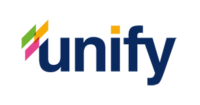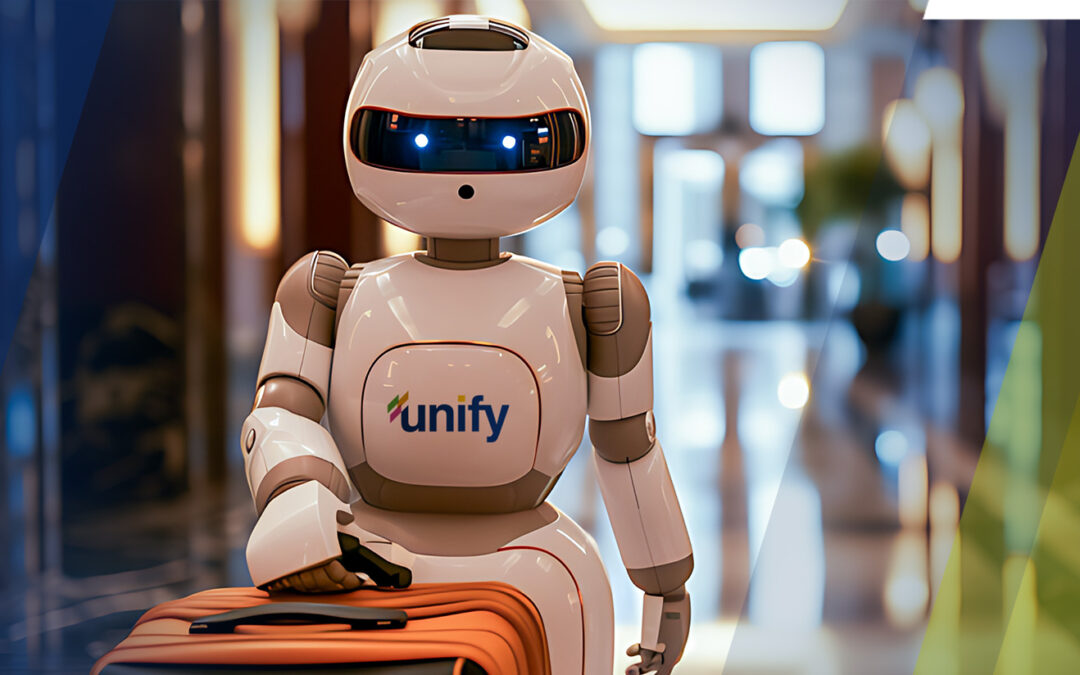8% of guests feel that AI improves their hotel booking and stay experiences, but why is that?
In early stages, the main purpose behind employing artificial intelligence in hotels was the automation of repetitive tasks, as well as basic data analysis. However, rapid and significant technological advancements quickly transformed it into an essential tool within the hospitality industry.
From operational excellence to tailored experiences, the use of artificial intelligence in hotels enhances productivity and personalisation, leaving both industry professionals and guests more satisfied than ever.
Using Artificial Intelligence in Hotels
How do hotels use artificial intelligence? What are the key applications, and how are they beneficial? The employment of artificial intelligence in hotels was originally made with the aim of enhancing operational efficiency. However, its applications have evolved beyond expectations since then.
Artificial intelligence is expected to power 95% of customer interactions by 2025.
Making continuous enhancements to the guest experience is essential for maintaining a competitive advantage, a happy guest is a returning guest. With technology taking over, the integration of artificial intelligence in hotels is now necessary.
5 Key Applications
1.Process Automations
The automation of routine tasks completely changed hotel operations. Previously, staff had to repeat the same lengthy processes with every guest. This took a lot of time and effort, but more importantly, it left a lot of room for human error.
Using AI to automate repetitive tasks allowed staff to focus on tasks of higher complexity that require human skills and emotional intelligence. Moreover, this decreased their workload, which decreased work-related stress too. This creates a happier team, with the capacity to engage in meaningful interactions to foster guest loyalty.
From a managerial point of view, there’s an added benefit — a significantly lower margin of error.
The most commonly automated processes in hotels include:
- Check-ins / Check-outs
- Booking confirmation
- Room assignment
- Shift scheduling
- Task allocation
2.Data Analytics
Hotels are home to some of the largest databases in the world. Mainly due to security reasons, detailed guest data needs to be collected and kept on record. The vast amount of historical data available makes the use of artificial intelligence in hotels much more valuable.
Using AI tools such as Salesforce Sales Cloud Einstein, can analyse data to forecast future trends, allowing decision-makers to act proactively and maximise their revenue. Predictive analytics can aid in optimising operations through:
- Predicting booking patterns to manage inventory
- Forecast market changes to adjusting pricing strategies in real-time
- Predicting guest preferences to tailor marketing efforts
It’s no secret that customer expectations are on the rise, hyper-personalisation has become essential for creating memorable experiences. In fact 60% of consumers say they’ll become repeat customers if they receive a personalised experience. Advanced data analysis tools, like Salesforce analytics, utilise the power of AI to help in understanding individual customer behaviours, preferences and needs. The use of artificial intelligence in hotels has allowed them to offer customised experiences:
- Room Customisation — adjusting room settings like lighting and temperature based on guest preferences
- Food Recommendations — tailoring culinary experiences and suggesting personalised meal options based on previous selections
- Activity Suggestions — generate activity itineraries based on hobbies and interests (these can include local attractions and hotel amenities)
Top Tip: Some guest information may be sensitive, make sure you have a robust strategy set for data privacy management before using any of your data.
Read more on ISO 27001 — the most current version of the ISMS standard.
3.Energy Management
One key application of artificial intelligence in hotels for energy management systems: systems used to monitor and control energy usage rates. AI-based energy management systems are gaining popularity because they support organisations in achieving two main goals: sustainability and cost reduction. This gives organisations a competitive edge and sets them apart from other hotels.
AI can track weather conditions in real time and adjust energy flow across different areas accordingly, lowering operational costs. This can be beneficial in optimising the usage of different energy-consuming processes, such as:
- Heating
- Cooling
- Lighting
4.Revenue Optimisation
Although essential for effective revenue management, tracking demand levels and market trends can be a difficult task when done manually. Integrating AI into revenue management systems is key to maximising profitability. For hotels, artificial intelligence can automatically monitor market changes and make adjustments in real-time in different areas, including:
- Marketing: Generating tailored offers to enhance campaign effectiveness.
- Sales: Dynamically adjusting room rates to maintain competitive pricing and maximise occupancy rates.
- Lead management: Automatically gathering and nurturing leads to increase conversion rates. For more details, explore the Salesforce Lead Management Process.
- Inventory management: Effectively managing resources based on demand to ensure effective allocation and avoid potential waste.
- Forecasting accuracy: Easing the decision-making and planning processes by increasing the accuracy of sales forecasts, ultimately achieving higher sales and revenue levels.
By responding to the changes in market conditions in real-time, hotels can ensure optimal revenue generation.
5.Customer Support
The majority of daily inquiries are very repetitive and quite simple, conversational AI can be used to handle these interactions. AI chatbots can automate up to 70% of customers’ requests. These chatbots mimic customer support representatives: they process incoming inquiries and generate responses using natural language processing and machine learning.
90% of customers expect an immediate response when contacting support and chatbots offer 24/7 support. Their ability to analyse huge amounts of customer data rather quickly means that not only are issues resolved in a timely manner, the conversations are also personalised.
A positive experience with AI support software can raise customer satisfaction by up to 20%. Hotels can streamline their operations by utilising chatbots to:
- Handle booking inquiries and confirm reservations
- Provide personalised recommendations to guests based on preferences
- Offer information on hotel amenities and local attractions
Customer Relationship Management and AI
78% of hotel executives believe that integrating AI with their CRM systems can significantly enhance customer insights and decision-making.
Integrating artificial intelligence into hotel operations has many benefits, but integrating it into your CRM software transforms the way you manage relationships with your guests.
Why Integrate AI with Your CRM?
The benefits to using artificial intelligence in hotels can be amplified when integrating directly into your CRM software. It’s particularly helpful in easing the personalisation process. Instead of collecting data, organising it and feeding it to the AI software of your choice, you can completely automate this process.
Benefits of this integration include:
- Accurate Insights: automation reduces chances of human error during data collection/entry.
- Real-time Updates: direct access to CRM data allows AI to analyse it in real time.
- Revenue Increase: higher operational efficiency and less manual labour needed leads to an increase in sales and a reduction in costs.
Steps to Integration
Evaluating Existing Systems
Assess your existing hotel CRM software. Determine its capabilities and limitations to identify if, where and how the integration of AI can add value.
What can your systems already do?
What are you looking to do using AI?
Setting Goals
You need to set clear, achievable goals to guide the integration process. If you don’t have a vision of what you’re aiming to get out of the AI integration, you won’t be able to set an effective action plan: this puts you at risk of wasting resources.
What goals are you aiming to achieve by integrating AI?
Which areas are you focusing on during the integration process?
How are you going to measure progress?
Choosing AI Tools
With the increase in the number of products available on the market, deciding on which AI tools to use can be difficult. Look for tools that are compatible with your existing systems: for example, Salesforce’s Einstein AI offers lots of features developed specifically to enhance CRM capabilities.
Is this tool compatible with your CRM system?
What features make it stand out?
Are there any reviews available from existing users?
Pilot Testing
Avoid jumping into a full-scale rollout, start by testing on a small scale. Choose a group of users for testing, preferably those who will be frequent users. When the testing is done, collect feedback and make adjustments if necessary; this helps in identifying any potential issues early on.
Leading AI software for your Hotel
Powered with Einstein AI, Salesforce stands out as the best CRM software for hotels. Experiencing the benefits of using artificial intelligence in hotels is seamless when it’s part of the CRM system you’re already using.
Nobody knows your organisation better than you do. And although the benefits of using Salesforce CRM are extensive, investing in new systems and services takes a lot of consideration. We’re Unify, a global Salesforce Agency, that works closely with ambitious, customer-centric organisations worldwide. We offer expert advice to drive digital transformation, optimise customer experiences, and achieve operational excellence.
For a detailed consultation and to learn how Salesforce can benefit your organisation, contact Unify Data & Analytics today.

